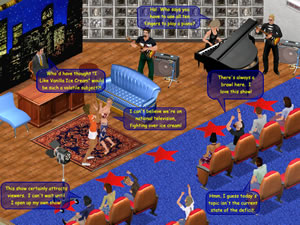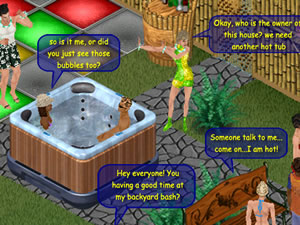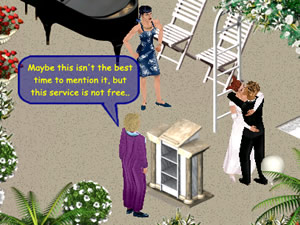Chatting For Dummies.
In 2000, Maxis introduced its innovative breakthrough title The
Sims, a virtual neighborhood whose inhabitants, architecture and interior
design were the creations of the player – a great boon to introverts and shut-ins
around the world. Since that time, Maxis has appeased Sim fanatics by releasing
a series of expansions to a game which has remained essentially the same for about
three years.
Fans have waited patiently for a new take on their simulated universe, and
Maxis has responded (sort of) with The Sims Online, a stand alone, massively-multiplayer
game in which every “Sim” encountered is actually another poor shut-in with
too much time of their hands. The result is a lateral move for The Sims rather
than a true step forward.
It’s important
to note right off the bat that you cannot import previously created Sims from
the single-player games – you have to start from scratch. Players create their
Sims from a large palette of faces and wardrobe options. You then select the
city that will become the permanent stomping grounds for your Sim, after which
your virtual alter ego begins its journey.
Your Sim will have to make its way in the world with a mere 10,000 Simoleons in its pocket; that’s money to give away, money to shop with, and money for purchasing property, as well as for feeding and entertaining your Sim. And you will soon discover how paltry a sum 10,000 Simoleons can be.
While absolutely not a requirement of play, property lots can be bought at any time and, although a Sim may only own one lot at any given time, they may be vastly expanded. Once property is purchased, players have the opportunity to test out their architectural skills by constructing their own house – but they will have to do this cautiously. Building materials are expensive and, unlike the single-player versions, players are not reimbursed when deleting construction objects like floors, walls and stairways, even if they have never been used.
And don’t get too carried away building a house that you forget you will also need to purchase every single thing that house will contain — like a decent toilet, refrigerator, shower and bed, all of which costs dearly.
Money in The Sims Online is just as crucial as it is in reality…or
more so. Acquiring cash isn’t anywhere near as easy as it is in the single-player
game where you merely orchestrated your Sim’s rise up the promotion ladder without
actually having to bear witness to your Sim at labor.
The money your Sim has is proportionate to the amount of work you’re willing
to watch your Sim do. The available “jobs” leave a lot to be desired as no true
careers actually exist in this game. Players merely drag their Sim from one
location to the next, doing things like carving gnomes, making preserves, creating
potions, or solving problems on a blackboard. The fruits of these labors can
then be sold to thin air for chump change.
Although the animations the Sims go through as they are working are complex and detailed, they are almost entirely non-interactive (with the exception of the pizza-making station, ironically enough). You simply click on a “work object” and your Sim begins the process of “working” with absolutely no help from you. Since it takes a good while to produce potions, gnomes, preserves and solutions, you may find yourself in deep conversation on the phone, rooting through the refrigerator for a snack, or reading a book while your Sim counterpart is busy “at work.” Real-time labor is not a spectator sport, despite the best wishes of Maxis and the folks at EA.
 In order
In order
to make any decent money, your Sim will need to improve his/her skills. You
are offered your choice of six different skills in which you may advance by
the tedious means of “researching” (i.e. your Sim tapping on a computer keyboard),
or reading cookbooks, or working out on an exercise machine, etc. Sims do not
acquire skills as they work, but only in doing things which are just as dull
and non-interactive but which don’t net money or fun.
At first glance, it would seem that your Sim has the capability of earning up to 10 Skill Points in each of 6 different fields, but this is not the case. Once a Sim has acquired more than 10 Skill Points, whether in a single area or spread out over several fields, those Skill Points will begin to “decay.” This makes it impossible for your Sim to possess more than 10 total points. And since the money your Sim makes is directly related to how many Skill Points they have, you have no incentive but to specialize in broadly general fields like Cooking and Logic; careers do not get more specific than that.
The Sims Online is burdened by an intense emphasis on drudgery and
an amazing lack of emphasis on fun – unless it’s a quick pit stop at a pool
table or in front of a TV to juice up your Sim’s Fun meter to prepare for more
work. That’s just a little bit too much like real life for my tastes.
Apparently aware that working and acquiring skills in this game is about as riveting as watching paint dry, Maxis deviously incorporated a timer that keeps track of how long a player has been idle and kicks anyone that’s been AFK a little too long. This will force you to at least nudge the mouse every fifteen minutes or so, but it certainly won’t make you more enamored of this poorly conceived production.
In the single-player version of The Sims, Interests, Personality traits,
and even Zodiac signs helped pave the path of your Sim’s journey to success
or failure. But The Sims Online depends on the player to bring these
things to the game, thereby customizing it to their own style of play simply
by virtue of the players’ own personality (or lack thereof). This is, indeed,
the highlight of the game and it takes great pains to coerce a spirit of togetherness
in players, or at least a determination to remain in a crowd at all times.
 Sims are
Sims are
almost totally dependent on one another to achieve anything. A Sim alone trying
to beef up their cooking skill by reading a book will be reading that book for
an eternity without gaining any smarts, but 10 Sims in one place reading cookbooks
causes Skill Points to accumulate much more quickly. The same is true with earning
money; groups of Sims doing the same thing at the same time make more cash.
The game goes so far as to actually financially penalize a Sim – depending on
the size of their lot – for not having the prescribed number of roommates, as
if sharing costs and companionship could not be incentive enough.
The main appeal of The Sims Online is the other players you will encounter
in your wanderings and travails. They are, essentially, what makes or breaks
this game – principally because there is so little else to it. Although your
Sims have animated interactions that players can initiate, the majority of communication
in The Sims Online is via typed messages which appear in word balloons
over Sims’ heads. Since your Sim, in large part, has no need of your services,
you will probably spend more time chatting with other players than anything
else. The game even possesses its own versions of e-mail and Instant Messaging
to make the flow of dialogue even easier. Communication is definitely the best
realized feature in the game.
The game’s worst quality is its stunning monotony. Even the houses of other
players you will visit have an eerie Levittown-like
redundancy. Since a player can earn money simply by enticing other players to
congregate on their property, and because all the other players truly want to
do is earn money, the object of the game is reduced to building – not a “house”
in which your Sim will live, but a labor camp in which other Sims will come
to earn money. Providing beds, showers, food and a pool table persuades your
guests to stay longer and spend more of the money they are earning, owing their
souls to the company store, so to speak, and never truly needing a place of
their own. The result is a “city” in which nearly every house is a sweatshop
because, as Martha Stewart knows, sweatshops make money.
Speaking of which, you’ll have to pay an ongoing subscription of about 10 bucks
a month to continue your life as a servant. While that’s a bit cheaper than
most MMORPG’s, it isn’t really worth what you get here.
The Sims Online is far too dependent on players providing the fun,
and that’s not a good thing. While the end result may be the most creative and
innovative online chat room available, it does not make for a riveting game
or one that is worthy of the great gaps of time required to play. Lack of graphical
improvements, cheap tricks to get players to throng together and the uninvolving
nature of the game in general make it difficult to recommend without reaping
a flood of negative karma.

-
Excellent use of Instant Messaging & e-mail
-
A good chatroom
-
Not a good game
-
Non-interactive work/skill objects
-
Lack of fun incentives
-
Come to my house! No, MINE!
-
Monotonous







